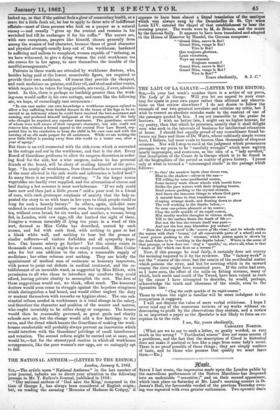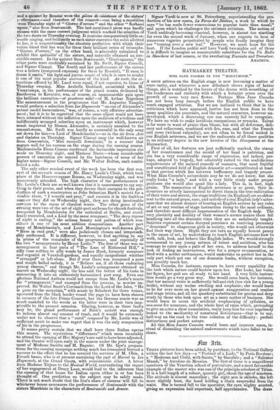3111sir.
smcz I last wrote, the impression made upon the London public by the marvellous performance of the Sisters Marchisio has deepened into an undeniable " sensation ;" and on their second appearance, which took place on Saturday at Mr. Land's morning concert in St. James's Hall, the favourable verdict of the previous Thursday even- ing was repeated with even greater enthusiasm. Two operatic duets
and a quintet by Rossini were the paces de resistance of the sisters'
rformance—and therefore of the concert—one being a repetition roni Thursday night of" Giorno d'orrore " and the other " Serband ognor," also from Semiramide. The last-mentioned piece was hardly chosen with the same correct judgment which marked the selection of the two duets on Thursday evening. It contains comparatively little en- semble singing, and brilliantly as each sister executes the solos allotted , to her, it is unquestionably the absolute perfection with which their voices blend that has won for them their brilliant series of triumphs. "Giorno d'orrore," on the other hand, is admirably calculated to exhibit this spicialia of the sisters, and naturally obtained an irre- sistible encore. In the quintet from Semiramide," Giuri ognuno," the other parts were creditably sustained by Mr. Swift, Signor Cosselli, and Signor Ciampi. The fourth and last performance of the sisters was a bolero (composed expressly for them by Rossini), "II suon le danze il canto," the light and joyous music of which is sure to render it one of the most popular morceauz of the kind. Au reale, the at- tractions offered by Mr. Land were equal, if not superior, to those of Thursday evening. Miss Arabella Goddard, associated with M. Vieuxtemps, in the performance of the grand sonata dedicated by Beethoven to Kreutzer, was, of course, an immeasurable gain upon the brilliant execution—et praderea M. Arthur Napoleon The announcement in the programme that Mr. Augustus Tamplin would perform a selection from Les Huguenots "on one of Alexandra's patent model harmoniums," was, of course, a very effective advertise- meat; but it is to be regretted that the same object could not have been attained without the infliction upon the audience of a tedious and indifferently arranged selection upon an instrument which, however much improved by Messrs. Alexandre, is certainly unsuited to the concert-room. Mr. Swift was hardly so successful in the only song set down for him—a Lied of Mendelssohn's—as in the air from Jos and Galatea on Thursday. Signor Ciampi sang the well-known air from Cesserentola, "Miei rampolli femminini," in a manner that augurs well for his success on the stage during the ensuing season. Mademoiselle Elena Conran confirmed the favourable impression she made on Thursday night, and Madame Dario—whose considerable powers of execution are marred by the harshness of some of her higher notes—Signor Cosselli, and Mr. Walter Bolton, each contri- buted a solo.
The only other musical event of the week has been the first con- cert of the seventh season of Mr. Henry Leslie's Choir, which took place at the Hanover-square Rooms, on Wednesday night, and was numerously attended. The high character of the performances of Dlr. Leslie's Choir are so well known that it is unnecessary to say any- thing in their praise, and when they devote their energies to the pro- duction of such a masterpiece as John Sebastian Bach's motett for a double choir, "I wrestle and pray," and execute it in the faultless manner they did on Wednesday night, they are doing inestimable services to the cause of classical music. The other gems of the evening were two of the set of eight-part anthems for church festivals, composed by Mendelssolin for the cathedral at Berlin, and excel- lently executed, and a Lied by the same composer, "The deep repose of night is ending," the solemn beauty and palhos of which con- stitute it one of his most sublime compositions. Another part song of Mendelssolues, and Lord Momingtou's well-known glee, "Here in cool grot," were also judiciously chosen and irreproach- ably performed. It is different, however, to find anything to say in praise of the remainder of the programme, and especially of the two "arrangements by Henry Leslie. The first of these was an arrangement in four parts of "The Lass of Richmond Hill," a silly tune written to silly words by James Hook, formerly composer and organist at Vauxhall-gardens, and equally insignificant whether "arranged" or left alone. But if ever there was composed a pure and simple ballad melody, it is "Believe me, if all those endearing young charms," and though Mr. Leslie's arrangement obtained an encore on Wednesday night, the less said the better of his taste in converting it into an elaborately harmonized part song. Even our glorious National Anthem could not escape from Mr. Leslie's mania for "arrangement," and emerged from the process, in nowise im- proved. Sir Walter Scott's Coronach from the Lord of the Isles, "He is gone on the mountain," with music by Schubert for three voices, appeared from the black border round the page to have been chosen in memory of the late Prince Consort, but the German music was as much unsuited to the words as the latter were in their turn inap- plicable to the present occasion. Glaring, however, as these faults may be, the grand performance of Bach's motett was enough to redeem almost any amount of trash, and it would be extremely unfair not to observe that a "carol" composed by Mr. Leslie was of sufficient merit to make one regret that it was the only composition of his in the programme.
It seems pretty certain that we shall have three Italian operas this season. The mysterious "differences" which seem invariably to attend the opening of Her Majesty's are said to have been adjusted, and the theatre will open early in the season under the joint manage- ment of Madame Sarolta and M. Bagnier. Of Mr. Gye's prepara- tions for the ensuing campaign nothing much has transpired beyond a rumour to the effect that he has secured the services of M. Obin, a French basso, who is at present sustaining the part of Marcel in Les Huguenots, at the Grand Opera, with considerable eclat. A letter from Madame 'ritjens to the Musical World, contradicting the report of her engagement at Drury Lane, would lead to the inference that the opening of that house for Italian opera either is or has been thought of. One prediction on the subject may be safely made. There is not much doubt that the lion's share of success will fall to whichever house announces the performance of Semiramide with the sisters Aiarchisio in the characters of Semiraniide and zlrsace.
Signor Verdi is now at St. Petersburg, superintending the 'pro- duction of his new opera, La Forza del Destino, a work in which he says "he has made fewer concessions to popular taste than usual," and upon which he challenges the strictest criticism. The notion of Verdi suddenly becoming classical, however, is almost too startling for even the second week of January, when one expects to hear of numerous vagaries perpetrated by people who fondly imagine they are "turning over a new leaf." However, we must hope for the best. If the London public will have Verdi two nights out of three it is difficult to imagine an unacceptable substitute for the Un Hello in Maschera of last season, or the everlasting Traviata and Trovatore.
AMATEUR.































 Previous page
Previous page